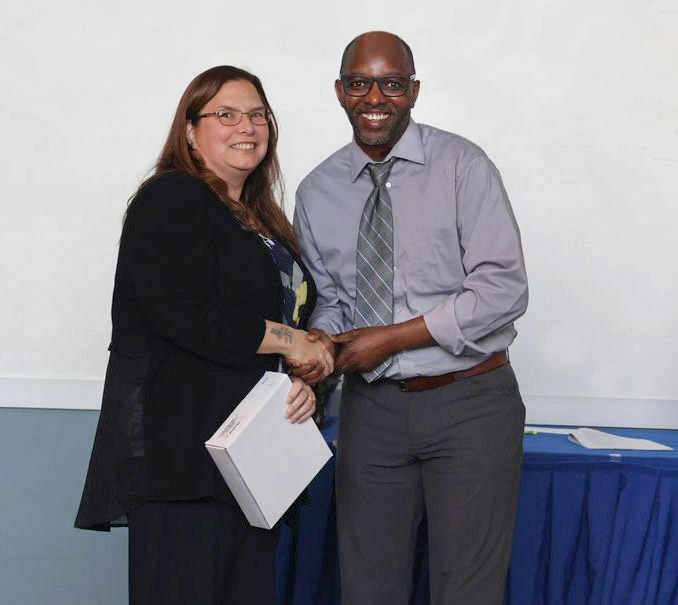Online program offering specialized training in informatics aspects of health sees first graduates
Every program has its hallmark. For SUNY Polytechnic Institute’s Master of Science in Health Informatics (HI) program, it’s “teaching the hands-on skills that employers are looking for,” explains Associate Professor and Program Coordinator Dr. Jerome Niyirora.
“Employers are looking for people who can do their analytics,” said Dr. Niyirora. “We teach students skills such as machine learning, database management, and data visualization. When they enter the job market, they should be able to work with Python, Tableau, and Excel. The other thing that concerns healthcare is privacy and security. We make sure our students are prepared in those areas as well.”
Launched in 2020, the online HI program is designed to provide specialized training in the informatics aspects of health, information science and technology, and social and behavioral science, as delineated in the foundational domains of the Commission on Accreditation for Health Informatics and Information Management Education (CAHIIM). A particular emphasis is placed on health information science and technology to help train the workforce to meet the expanding need for experts in this area.
In addition to adding his expertise and leadership to the program, Dr. Niyirora can also relate to many of the students entering the program and what academic tracks they are on, as he is an alum of the institution. Dr. Niyirora graduated with two Bachelor of Professional Studies degrees (Health Information Management and Health Services Management) and a Master of Science in Health Services Administration.
This past academic year, the HI program saw its first two graduates: Natalya Leschuk and Michele Phillips — the most recent being Phillips, a Niagara County resident.
For 15 years, Ms. Phillips has worked for a data management center that primarily deals with HIV clinical trials. After earning her Bachelor’s degree in Health Information Management from SUNY Poly in 2020, she immediately jumped into the HI program. Around the same time, she transitioned into a new role at the company, becoming their medical coding supervisor.
“The HI program has really helped me be able to work with my programming and database staff and understand more of what they’re saying to me,” she said. “The program was challenging but very much needed to be able to go further in any healthcare field. You really need to have that solid base of being able to create databases, [in addition to] being able to pull data and understand what you’re looking at. That’s what we’re doing at my data management job. Without that technical piece behind you, it makes the job more difficult.”
In addition to completing coursework, all students in the HI program must complete a capstone project. Ms. Phillips worked with a team at Bassett Healthcare Network, helping to implement their new skin injury prevention program, as skin injuries/ulcers are not only detrimental to patients, but also extremely costly for facilities to treat.
“Preventing them from happening in the first place is key,” said Ms. Phillips. “They were implementing a new system, doing a three-month pilot with it. Once it’s completed, they’ll run the data and hopefully be able to push that system out to all of their facilities. It was pretty exciting to jump into the project and work closely with the team at Bassett to design a new skin prevention process.”

Ultimately, by the time HI program graduates enter the workforce, they should be able to: demonstrate basic proficiency in understanding the theories and methods of social and behavioral science applicable to health informatics; demonstrate advanced knowledge of the concepts, methods, tools, and current challenges of health informatics; demonstrate the mastery of computerized tools of information science and technology applied to health; integrate the concepts, methods, and tools of social, behavioral, information science and technology to evaluate, design, and implement solutions to health informatics problems; and employ effective collaborative leadership, ethical principles, and professional practices to motivate system thinking and a team approach to solving complex health informatics problems.
There’s some new and exciting news for students interested in following Ms. Phillips’ track of Health Information Management to Health Informatics. SUNY Poly recently announced an accelerated (B.S./B.P.S.) / M.S. program that allows students to complete both a bachelor’s degree in Health Information Management and a master’s degree in Health Informatics in a reduced time frame by applying up to 12 graduate credits to their undergraduate degrees. A typical first-year student will be able to complete this new program in five years, whereas a full-time transfer student can finish it in three years.
For more information about the HI program, click here.
